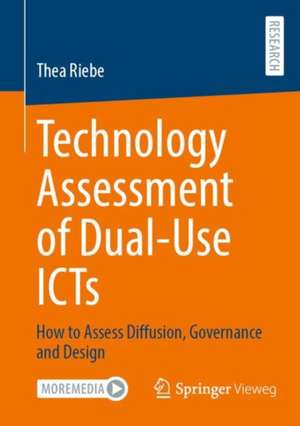Technology Assessment of Dual-Use ICTs: How to Assess Diffusion, Governance and Design
Autor Thea Riebeen Limba Engleză Paperback – iul 2023
Preț: 703.38 lei
Preț vechi: 879.23 lei
-20% Nou
Puncte Express: 1055
Preț estimativ în valută:
134.66€ • 140.50$ • 112.88£
134.66€ • 140.50$ • 112.88£
Carte tipărită la comandă
Livrare economică 12-26 martie
Preluare comenzi: 021 569.72.76
Specificații
ISBN-13: 9783658416669
ISBN-10: 3658416661
Ilustrații: XXV, 310 p. 36 illus. Textbook for German language market.
Dimensiuni: 148 x 210 mm
Greutate: 0.45 kg
Ediția:1st ed. 2023
Editura: Springer Fachmedien Wiesbaden
Colecția Springer Vieweg
Locul publicării:Wiesbaden, Germany
ISBN-10: 3658416661
Ilustrații: XXV, 310 p. 36 illus. Textbook for German language market.
Dimensiuni: 148 x 210 mm
Greutate: 0.45 kg
Ediția:1st ed. 2023
Editura: Springer Fachmedien Wiesbaden
Colecția Springer Vieweg
Locul publicării:Wiesbaden, Germany
Cuprins
Introduction.- Theoretical Background and Related Work.- Research Design.- Results.- Discussion.- Conclusion.- Measuring Spillover Effects from Defense to Civilian Sectors: A Quantitative Approach Using LinkedIn.- Dual-Use and Trustworthy? A Mixed Methods Analysis of AI Diffusion between Civilian and Defense R&D.- Meaningful Human Control of LAWS: The CCW-Debate and its Implications for Value-Sensitive Design.- U.S. Security Policy: The Dual-Use Regulation of Cryptography and its Effects on Surveillance.- Values and Value Conflicts in the Context of OSINT Technologies for Cybersecurity Incident Response.- Computer Emergency Response Teams and the German Cyber Defense: An Analysis of CERTs on Federal and State Level.- Privacy Concerns and Acceptance Factors of OSINT for Cybersecurity: A Representative Survey.- CySecAlert: An Alert Generation System for Cyber Security Events Using Open Source Intelligence Data.- Bibliography.
Notă biografică
About the author:
Thea Riebe is a post-doctoral researcher at the Chair of Science and Technology for Peace and Security (PEASEC) in the Department of Computer Science at the TU Darmstadt. She did her interdisciplinary PhD on technology assessment of dual-use technologies in computer science, combining approaches from critical security research, and human-computer interaction.
Textul de pe ultima copertă
Information and Communication Technologies (ICTs) are important to human, national, and even international security. IT research, artifacts, and knowledge that can be applied in military and civilian contexts, used as part of weapon systems, or cause significant harm are referred to as dual-use. Advances in artificial intelligence (AI), robotics, cybersecurity, and open source intelligence (OSINT) raise questions about their dual-use risks. But how can dual-use of such disparate technologies be assessed? Case studies are still lacking on how to assess dual-use ICT and how to enable sensitive and responsible dual-use design. To address the research gap, this cumulative dissertation uses Technology Assessment (TA) as an epistemological framework to bring together approaches of Critical Security Studies (CSS) as well as Value Sensitive Design (VSD) from the field of Human-Computer Interaction (HCI). As a result, the dissertation systematizes the dual-use risks and scenarios of the selected ICTs and derives organizational and design implications.
About the author:
Thea Riebe is a post-doctoral researcher at the Chair of Science and Technology for Peace and Security (PEASEC) in the Department of Computer Science at the TU Darmstadt. She did her interdisciplinary PhD on technology assessment of dual-use technologies in computer science, combining approaches from critical security research, and human-computer interaction.
